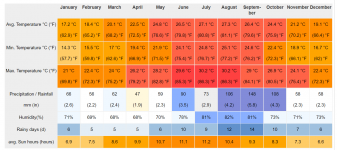- Mar 28, 2011
- 121
- Surface
- Plaster
- Chlorine
- Salt Water Generator
- SWG Type
- CircuPool RJ-45 Plus
I'm in the planning phase of a pool/spa build on the east coast in FL. Pool and spa will be around 12,000 gal total. Spa will be "average" size, 6' circle or square. I'm trying to decide on what equipment I will choose for spa heat.
Efficiency is very important to me, so I am thinking hard about what a spa heat experience will be like with a heat pump. I'd be looking at the new AquaCal variable speed. Or another variable speed if someone is aware of one.
Comparing this, of course, to a propane heater. I don't have any propane at my house, so I would have to purchase and bury a tank somewhere, making initial cost of propane the same or more expensive than the variable speed AquaCal. Then there's the hassle of shopping for cheap propane at the right time and monitoring tank level...
I've never heated my pool in FL, so I know that would be an added benefit of the heat pump, but not something that is really important to me.
I also plan to install solar photovoltaic in the next couple years, so an electric form of heating would essentially become free.
Previously, I have had spas with gas heat, so I'm used to having a 102 degree spa in about 30 minutes, regardless of the temperature outside. I know I won't have that with a ~130k BTU heat pump, but I also know we are in an ideal climate for heat pumps most of the year with our FL humidity and temperatures, as 80/80/80 is actually lower than what we have for most of the year.
It looks like a newer heat pump might take about an hour to get a spa to 100 degrees most of the year in my zipcode in FL. I can deal with that.
What I'd like to try to get an idea of, is how bad will that be in January-March? How long would heating take, and what would my maximum attainable temperature even be?
Efficiency is very important to me, so I am thinking hard about what a spa heat experience will be like with a heat pump. I'd be looking at the new AquaCal variable speed. Or another variable speed if someone is aware of one.
Comparing this, of course, to a propane heater. I don't have any propane at my house, so I would have to purchase and bury a tank somewhere, making initial cost of propane the same or more expensive than the variable speed AquaCal. Then there's the hassle of shopping for cheap propane at the right time and monitoring tank level...
I've never heated my pool in FL, so I know that would be an added benefit of the heat pump, but not something that is really important to me.
I also plan to install solar photovoltaic in the next couple years, so an electric form of heating would essentially become free.
Previously, I have had spas with gas heat, so I'm used to having a 102 degree spa in about 30 minutes, regardless of the temperature outside. I know I won't have that with a ~130k BTU heat pump, but I also know we are in an ideal climate for heat pumps most of the year with our FL humidity and temperatures, as 80/80/80 is actually lower than what we have for most of the year.
It looks like a newer heat pump might take about an hour to get a spa to 100 degrees most of the year in my zipcode in FL. I can deal with that.
What I'd like to try to get an idea of, is how bad will that be in January-March? How long would heating take, and what would my maximum attainable temperature even be?


